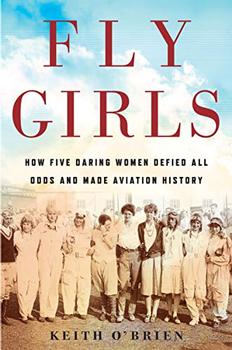Book Club Discussion Questions
In a book club? Subscribe to our Book Club Newsletter and get our best book club books of 2025!
Please be aware that this discussion guide will contain spoilers!
- What do you think about calling these remarkable women Fly Girls Do you think it was complimentary or derogatory, and why?
- Other than the central aviatrixes, which male and/or female figures stood out for you? Were there people you found that were particularly helpful or harmful to the women's cause?
- Even while competing, the women pilots were supportive of each other (e.g., agreeing to wait for Earhart to receive a new propeller). Why do you believe this was? Would it have been the same, do you think, had the participants been all male? Why or why not?
- Why do you think it took so long for women pilots to be accepted as equal to their male counterparts, in spite of their many accomplishments over the early years of flight?
- Even before her disappearance, Amelia Earhart was the most famous of the women flyers. Why do you think that was?
- How did you react to the men featured in the story? Were they helpful or harmful to the women's cause?
- Of the five main fliers featured (Earhart, Elder, Klingensmith, Nichols and Thaden), whose story did you most relate to?
- Other than Earhart, had you heard of any early female fliers, and if so, who?
- Why do you think Charles Lindbergh, the most famous flier of the era, wouldn't commit to supporting women pilot?
- Flying was a very risky endeavor, yet these women were determined. Do you think this level of danger exists in any hobbies today? What do you think attracts people to pursuits that could very well end their lives?
- Raymond Orteig, sponsor of the Orteig Prize, worried that his challenge was luring men to their deaths. Do you think he was liable for the injuries incurred by those who participated? Do you think this issue would have a different outcome today?
- Several aviators, male and female, were greeted by mobs, such as Elder's near successful completion of a trans-Atlantic flight. Why do you think these feats sparked peoples' passions? Can you think of modern-day public displays that similarly celebrate a person's or group's success?
- O'Brien states: "Elder was about to prove two points: a woman with a good plane and a bold plan was impossible to ignore – and easy to disparage." Do you think this dichotomy exists in modern society? Is a woman with a great plan both hard to ignore and easy to criticize?
- Early women fliers obviously took risks. What's the most reckless thing you've done, and how did it turn out?
- The women featured in Fly Girls were pioneers in their field. Which women pioneers have inspired you, and why?
- Earhart, Elder, Thaden and the other women were passionate about flying. Is there any activity you undertake that inspires this type of passion in you?
- Elder said, "I want to do something that will make people notice me, that may give me an opportunity to get somewhere in the word." A reporter asked her if it was worth risking her life, and she replied that it was. Do you agree?
- Oklahoma businessman (and outspoken critic) Erle Halliburton said, "Women have been dependent on men for guidance for so long that when they are put on their own resources they are handicapped." Do you think there's any truth to this, either then or now?
- The Fly Girls struggled to overcome gender stereotypes. Clearly much has changed over the decades. Do you think there are still fields where women struggle for acceptance?
- What do you think of the competitions that the women participated in? Why do you feel they were so compelled to take part? Why do you feel the events' backers put conditions on the events, potentially making them more difficult or dangerous?
Unless otherwise stated, this discussion guide is reprinted with the permission of Houghton Mifflin Harcourt.
Any page references refer to a USA edition of the book, usually the trade paperback version, and may vary in other editions.
